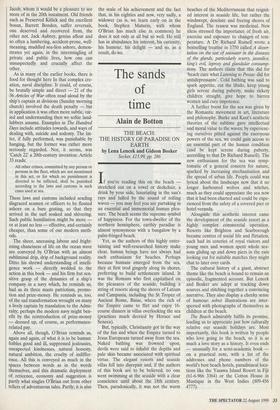The sands of time
Alain de Botton
THE BEACH: THE HISTORY OF PARADISE ON EARTH by Lena Lencek and Gideon Bosker Secker, £15.99, pp. 286 If you're reading this on the beach stretched out on a towel or deckchair, a drink by your side, luxuriating in the sun's rays and lulled by the sound of rolling waves — you may feel you are partaking in an essential and immemorial human plea- sure. The beach seems the supreme symbol of happiness. For the town-dweller of the northern hemisphere, earthly paradise is almost synonymous with a bungalow by a palm-fringed beach.
Yet, as the authors of this highly enter- taining and well-researched history make clear, human beings have not always had such enthusiasm for beaches. Perhaps because humans emerged from the sea, they at first trod gingerly along its shores, preferring to build settlements inland. It was the Romans who first capitalised on the pleasures of the seaside, building a string of resorts along the shores of Latium and Campania, including the St Tropez of Ancient Rome, Baiae, where the rich of the Empire came to flirt and enjoy 16- course dinners in villas overlooking the sea (practices much decried by Horace and Seneca).
But, typically, Christianity got in the way of the fun and when the Empire turned to Jesus Europeans turned away from the sea. Naked bathing was frowned upon, devils were said to inhabit the depths and pale skin became associated with spiritual virtue. The elegant resorts and seaside villas fell into disrepair and, if the authors of this book are to be believed, no one went swimming at the seaside with a clear conscience until about the 18th century. Then, paradoxically, it was not the warm beaches of the Mediterranean that reignit- ed interest in seaside life, but rather the windswept, desolate and freeing shores of England. The reason was medicinal. New ideas stressed the importance of fresh air, exercise and exposure to changes of tem- perature. A Dr Richard Russell wrote a bestselling treatise in 1750 called A disser- tation on the use of seawater in the diseases of the glands, particularly scurvy, jaundice, king's evil, leprosy and glandular consump- tions. The authors claim that this did for `beach cure what Listening to Prozac did for antidepressants'. Cold bathing was said to spark appetite, cut the libido, keep young girls serene during puberty, make rickety children straight, give hope to barren women and cure impotence.
A further boost for the sea was given by the Romantic movement in art, literature and philosophy. Burke and Kant's aesthetic theories of the sublime gave intellectual and moral value to the waves; by experienc- ing ourselves pitted against the enormous powers of the sea, we could gain access to an essential part of the human condition (and be kept serene during puberty, according to that Dr Richard Russell). The new enthusiasm for the sea was symp- tomatic of a general concern for nature, sparked by increasing mechanisation and the spread of urban life. People could wax lyrical about the landscape now that it no longer harboured wolves and witches, much as they could appreciate the sea now that it had been charted and could be expe- rienced from the safety of a covered pier or hotel veranda.
Alongside this aesthetic interest came the development of the seaside resort as a highly complex commercial operation. Resorts like Brighton and Scarborough became centres of social life and flirtation, each had its coteries of royal visitors and young men and women spent whole sea- sons gliding up and down piers in the rain looking out for suitable matches they might chat to later over cards.
The cultural history of a giant, abstract theme like the beach is bound to remain an episodic, fragmented account. But Lencek and Bosker are adept at tracking down sources and stitching together a convincing narrative. They also display a cheeky sense of humour: sober illustrations are inter- spersed with photographs of themselves as children at the beach.
The Beach admirably fulfils its promise, leading us to appreciate just how culturally relative our seaside holidays are. Most importantly, this book is written by people who love going to the beach, so it is as much a love story as a history. It even ends — unusually for a semi-academic book on a practical note, with a list of the addresses and phone numbers of the world's best beach hotels, paradisiacal loca- tions like the Yasawa Island Resort in Fiji (61-6-966 3364) or the Cotton House in Mustique in the West Indies (809-456 4777).
























































 Previous page
Previous page